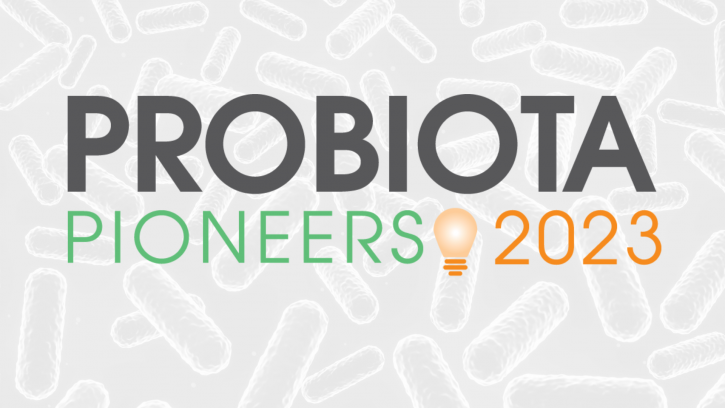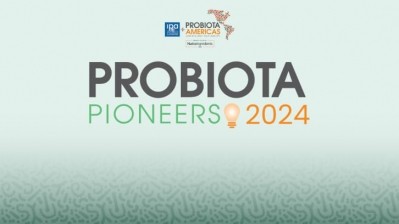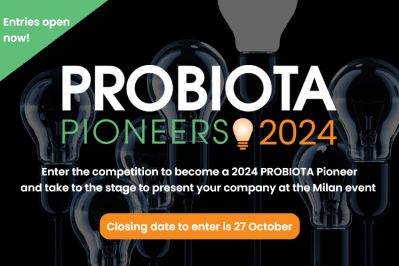Probiota Pioneers: Tiny Health on the birth of the baby gut microbiome test

Tiny Health, founded by Cheryl Sew Hoy, is the first microbiome platform to address infant gut imbalances. After giving birth to her first baby by C-section and second by vaginal delivery, Sew Hoy delved into microbiome research to explore potential explanations and remedies for her first child’s mild eczema and sesame allergy. This led her to identify a gap in microbiome testing and to go on to develop tools to help parents track their child’s microbiome recovery during the critical first 1,000 days of life.
Sew Hoy shared a bit about Tiny’s Health journey so far and what the startup has in store.
NIU: What went into bringing the first test to market?
CSH: We put together a team of leading scientists, physicians, and microbiologists who spent over a year researching scientific publications on the infant gut microbiome, its association with chronic conditions, and specific strategies to improve gut health. They pulled huge amounts of publicly available gut microbiome data and analyzed it to generate over 70 key insights and age-specific ranges for health markers and signatures. This led to the development of a proprietary bioinformatics pipeline to provide analysis and information to parents everywhere.
The Tiny Health store launched in April 2022 with the help of seed funding from key partners and investors. Since then, we’ve sold tens of thousands of kits and are excited to continue growing and learning with our users.
NIU: Why is it so important to detect gut imbalances early on?
CSH: The first 1,000 days of life, from conception until about two years old, represent a crucial window that influences a child’s lifelong health, with the gut microbiome at the core of this period of immune development. During the first years of life, the gut microbiome is a dynamic, rapidly changing microbial community. Microbial colonization of the gut starts at birth, when the baby is exposed to vaginal or environmental microbes, and microbes from mom’s breastmilk and skin. Many factors in early infancy such as antibiotic usage, C-section delivery, and formula-feeding may disrupt the natural gut colonization process, impacting overall health, and increasing the risk of chronic diseases and immune disorders. These include asthma, eczema, food allergies, obesity, and type I diabetes.
It is also during this time that the gut microbiome is most malleable and responsive to interventions, such as colonization by beneficial bacteria. Over time as the infant acquires more and more microbial species, and begins to eat solid foods, the gut microbiome matures. Typically, the gut microbiome reaches full, adult-like maturity by the time a child is 3-5 years old, at which point it is more stable and resistant to intervention.
NIU: How has Tiny Health’s product offering evolved since launch? Do you have additional research initiatives and/or products in the pipeline?
CSH: Since launch, we have continued to develop nearly 100 new metrics, including functional gene evaluations, each of which are specific for sample type and age range. Many of these metrics can only be found at Tiny Health such as Antibiotic Resistance Signature and C-section Signature. Alongside metrics for age specific gut health, our science team is also working on health conditions research through identification and evaluation of key microbiome biomarkers.
Current development initiatives include the addition of probiotic strain tracking into our analyses and reports so that we can let parents know at the highest degree of specificity if the probiotics they are using are being detected and at what levels, as well as the training of a highly accurate model for microbiome age, so we can help parents better understand how their child’s microbiome maturation is progressing.
Tiny Health also plans to launch two clinical studies in 2023 to demonstrate that microbiome testing, education and awareness paired with recommended intervention programs results in an improved gut microbiome community, fewer gut dysbiosis-related symptoms and improved lifelong health outcomes, especially in infants.
NIU: How does Tiny Health determine its recommendations for the restoration of a baby’s gut microbiome? How personalized is this?
CSH: Tiny Health’s Science Team, which has cumulatively authored 75 publications in the fields of gut health, genomics, and the gut microbiome, carefully review the available scientific literature behind every recommendation made in the app. The quality of published sources is scored based on study sample size, experimental design, analytical methods, and other relevant considerations. If a certain probiotic, prebiotic, dietary change, or other actionable intervention is significantly supported by the scientific literature, it is considered a candidate for addition to our Action Plans. New recommendations are only incorporated after they have been thoroughly vetted with input from all members of the Science Team.
Recommendations are highly personalized. Recommended Action items are triggered by information provided by users about their or their baby’s diet, allergies, and medical conditions or by microbiome results in our key insights categories. For example, high levels of Escherichia coli in a baby will trigger a recommendation for probiotics containing Bifidobacterium strains and prebiotics that can support Bifidobacterium growth, based on evidence that this strategy can outcompete and lower E. coli levels.
NIU: How would you describe how your approach or ethos is treading a path or direction that no other firm has explored before?
CSH: Tiny Health is the first gut health platform for babies and expecting parents that uses shotgun metagenomic sequencing. Shotgun is the most advanced technology and is the gold standard for microbiome sequencing in research.
Microbiome science is advancing at an unprecedented pace. While the field is still young, we are beginning to understand the impact of the early gut microbiome on long-term health. The early gut microbiome is about 10 times less diverse than the adult microbiome in terms of unique species, and it is possible to identify robust associations between the abundance of certain species early on and the risk of developing specific chronic illnesses or immune disorders.
Tiny Health’s science-based product accelerates this knowledge and shares it with parents now – and not 10-15 years later. Our database comprises one of the largest in-depth repositories of early life microbiome data, as well as clinical and nutritional metadata from the mother and infant dyad.
We deliver comprehensive microbiome reports that analyze gut microbiome composition and functionality of each person, any microbial biomarkers or signatures associated with disease risk from our highly curated association panel, and actionable recommendations that can empower parents and improve gut health. We believe this empowerment of parents through knowledge and personalized recommendations in the critical early years can significantly preempt the immense burden on our healthcare systems, and our lives, that chronic atopic diseases impose.
NIU: In the probiotic, prebiotic and microbiome space, what would you say is the next research area that the industry needs to keep its eye on?
CSH: It is exciting to see that within the last year the FDA has approved for the first time live biotherapeutic products (Rebyota and Vowst). Both are defined microbial consortia from healthy donors with impressive efficacy in remission from recurrent Clostrioides difficile infection. Defined, but still diverse, microbial consortia may be more robust to the stressors of a dysbiotic gut and offer more complex and synergistic properties due to inter-microbial interactions than simpler probiotic formulations. They represent an exciting opportunity for future innovation in microbiome-directed therapies in the pediatric space.
Engineered microbial therapeutics are also likely to be at the forefront of the next wave of microbiome innovation. For example, probiotics have been engineered to deliver immune checkpoint inhibitors and have shown successful treatment of colorectal cancers in animal models. Engineered probiotics for the treatment of some metabolic diseases like phenylketonuria have reached human trials. It will be critical to ensure the safety of genetically engineered probiotics, including understanding the impact that engineered microbial therapeutics have on patients’ microbiomes, both in the short- and long-term.
Finally, we are confident that continued improvement of sequencing and computational methods, and its growing availability, will increase the resolution and specificity of associations and inferences we can make about the role of the microbiome in disease. The microbiome is increasingly appreciated as both a diagnostic tool and therapeutic target for disease. We envision a world in which personalized, precision microbiome diagnostics and therapies are available from birth through adulthood.
NIU: What is the significance for Tiny Health of being named one of our 2023 Probiota Pioneers, and how do you think it helps your profile in such a gut innovative, ever-changing industry?
CSH: We are very honored to be recognized at such a prestigious conference where companies with groundbreaking probiotic solutions come to present their latest innovation in the industry. Being named one of the 2023 Probiota Pioneers helps us raise awareness of the important work we’re doing, and we hope to meet some amazing companies for potential partnerships.
Probiota Americas 2023
The event takes place June 14-16, 2023 at the Westin Chicago River North in Chicago. The three-day program will explore the state of the market, postbiotics, how plant breeding can impact the human gut microbiome, the regulatory landscapes for microbiome modulators in the US and Canada, the opportunity with pets, disruptive technologies like CRISPR, A.I., and -omics, microbiome modulation to support women’s health, and LBPs in the USA.
Participants include experts from NOW Health Group, Nouri, Postbiotics+, Microba, the University of Nebraska, the US Food & Drug Administration, Health Canada, Amin Talati Wasserman, the International Probiotics Association, the Broad Institute of MIT and Harvard, North Carolina State University, Synbiotic Health, Zbiotics, Morinaga, Kaneka, IFF, Fonterra, the National Animal Supplement Council, AnimalBiome, Persephone Pharma, ExeGi Pharma, University of São Paulo Medical School, SPINS and more.
Probiota 2023 in Barcelona was sold out, so don’t wait to reserve your spot for the leading annual event for the prebiotic, probiotic and the microbiota focused food and pharma industries across the Americas. Register today for Probiota Americas.
















